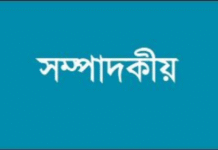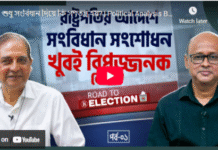Sadeq Khan
Political polarisation and confrontation in Bangladesh has now taken a decisive turn. The eighteen party opposition alliance including Jamaat-e-Islami and led by parliamentary Leader of the Opposition Begum Khaleda Zia is now set on collision course with the ruling alliance led by Prime Minister Sheikh Hasina. After five days of countrywide unrest and 70 hours’ continuous hartal immobilising the country, the BNP was holding a protest rally over “genocide” by the police in front of its central office on March 6 in Dhaka. A cocktail-bomb was thrown on the gathering and the police fired at the participants injuring several leaders. Result, another day of hartal on March 7. Leaders of the opposition eighteen party alliance sat down with Begum Khaleda Zia to chalk out a programme for final showdown. They intend to go for continuous action demanding immediate restoration of the caretaker system of government and resignation of the government to make way for general election.
The ruling party, emboldened by the “success” the rallying cry of its “non-party” following, critical of the International Crimes Tribunal (ICT)’s judgment awarding life imprisonment to Jamaat leader Kader Mollah and out to demand his death penalty, had amended the ICT law, and declared the date for the sentencing of popular religious preacher and Deputy Leader of Jamaat Moulana Delwar Hossain Sayeedi, only four days ahead of a scheduled 3-day visit by the President of India, Pranab Mukherjee, with whom most political leaders of Bangladesh across political divide maintained good relations. His death sentence triggered countrywide agitation, not only by Jamaat following but also by many devotees of Sayeedi’s sermons. Meanwhile, the “misconduct” of some young Shahbag bloggers, and their anti-Islam hate propaganda on-line had enraged other religious sections of Islamic learning. The highly-secured celebrations of the Indian presidential visit took place in the midst of 70 hours of continuous hartal. On the last day of the visit, Sreeram Sundar Chaulia, Dean, Jindal School of International Affairs, dispatched a commentary to the Times of India, reading as follows:
“Bangladesh is in the throes of a massive social upheaval, symbolised by the spirit of Shahbag- a neighbourhood in Dhaka that is being likened to Egypt’s Tahrir Square – where thousands of youth are marching to demand punishment of Islamist fundamentalists and their minders in the Pakistani military who committed genocide during the liberation war of 1971. It is a no-brainer that secular India, which has been a victim of terrorism emanating from Islamist outfits based in Bangladesh, is firmly on the side of the Shahbag vigil keepers. The president of India has a low-key but significant role to play as a promoter of India’s national interests abroad. As a nominal head of state, there are limits to his capabilities as a conductor of diplomacy. Yet, he can be a force multiplier of our foreign policy who can be deputed on sensitive international missions to carry powerful messages to the world at large.
That Mukherjee is undertaking his very first overseas tour to Bangladesh is noteworthy, given his own past association with its liberation struggle, and the Indian security establishment’s high stakes in the current imbroglio there. An experienced trouble-shooter who used to be frequently dispatched to douse domestic turbulence across India when he was a politician, Mukherjee has the linguistic as well as diplomatic skills to be useful in strengthening Hasina’s hand. A morale booster coming from the head of state of South Asia’s premier power, India, is a valuable asset for a regime that faces blackmail from Islamist terrorists.
New Delhi has often indicated that it prefers the moderate Islamic strain represented by Hasina’s Awami League, which is pressing forward with the war crimes reckoning process.
“While our tilt in favour of the mass outpouring in Shahbagh and the war crimes tribunal is a given, New Delhi is sensitive about preventing anti-India sentiments from becoming mainstreamed in Bangladesh. Last October, we hosted the leader of Bangladesh’s opposition, Khaleda Zia, who got an audience with President Mukherjee himself. This happened despite our distaste for her coalition ally, the Jamaat, and our fears of the ‘Talibanisation’ of Bangladesh if religious parties take power.
A singular pattern of politics has emerged in South Asia, wherein if India is sympathetic to one major party, then its opponents adopt a default anti-India stance, and vice versa. To break this vicious cycle and escape the label of a South Asian ‘big brother’ that always sides with one camp, we need to open channels to build assets across party lines.
The day when all principal political parties and movements in Nepal, Bangladesh, Sri Lanka, Maldives and Afghanistan consider India their friend will be when New Delhi can act more confidently. But to reach that stage, we have to continue engaging with extreme rightist or leftist forces who may win elections one day and potentially pose a serious problem on one of our borders. The Jamaat in Bangladesh may be too invested in hatred for India and what it represents; it is a tall order for us to reach an understanding with fanatics. But New Delhi must assiduously confer with Zia’s Bangladesh National Party (BNP) so that we cover all eventualities. The cancellation of her meeting with President Mukherjee during his present visit could be interpreted as a snub and a signal that India must devote extra attention to and develop sustained dialogue with the BNP.
A centrist political evolution is our best-case scenario, but preparing for worst-case outcomes is the crux of diplomacy. As Bangladesh hurtles towards general elections amidst a furore over alleged ‘persecution’ of the Jamaat, New Delhi must do the groundwork to ensure that whoever wins will be friendly towards us.”
But the mild recognition in the dispatch that “mass outpouring in Shahbag” under police protection may not be the true picture of the country mood as a whole is belated and the Indian ‘big brother’-ly visit siding with the ruling party’s election stance to portray the entire opposition as anti-social elements deserving the harshest application of the coercive powers of the state, has only coalesced a broader opposition of nationalists and Islamists in Bangladesh, the Jatiyo Party of the ruling alliance showing signs of “defection” to uphold Islamic values. The “singular pattern” of geopolitics in South Asia “adopting a default anti-India stance” appears to have been only compounded in Bangladesh by miscalculations of an Indian presidential visit.
Source: Holiday









